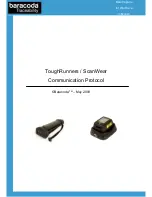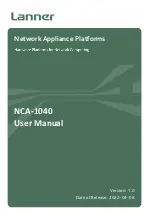
CentreCOM
AT-3624TS/AT-3624TRS Repeaters
49
DATA TERMINAL EQUIPMENT (DTE)—In RS232 specification a module
typically at the end of a segment. The DTE could be an Ethernet workstation,
repeater or bridge.
DEPARTMENT CONCENTRATOR—Hub which provides a large number of
workstation connections. The term, department concentrator, refers to
multiple repeaters housed in an AT-36C8 chassis. See Hub/Repeater,
Repeater.
DIX CONNECTOR—See D-Sub Connector
FOIRL — A fiber optic standard that allows up to 1,000 meters (3,280 ft.) of
multimode duplex fiber optic cable in a point-to-point link.
HARMONICA ADAPTER—This adapter provides a simple way to convert
the 50-pin Telco connection to RJ45 connections.
HEARTBEAT—See SQE
HOT SWAPPING— The process of replacing a hub module without bringing
down the network. This process occurs by sliding an active module into a fully
powered up concentrator, replacing a failed module.
HOUSE WIRING—House wiring is the existing wiring inside a building. This
wiring generally originates from one or more wiring closets such as a telephone
room. Some older buildings may have wiring unsuitable for 10 megabit data
rates. In these circumstances, it is recommended that the wiring is tested with
a 10BASE-T signal/wire tester.
HUB/REPEATER—A hub is a central signal distributor. It is used in a wiring
topology consisting of several point-to-point segments originating from a
central point. The term hub is often used interchangeably with the term
repeater. Multiport 10BASE-T, 10BASE2 and fiber optic (10BASE-FL, FOIRL)
repeaters are considered hubs. See Repeater.
HUB-to-HUB WIRING—See MAU-to-MAU Wiring
HUB-to-MAU WIRING—UTP cables for 10BASE-T hub-to-MAU or NIC
cards are wired straight-through. An RJ45 receptacle at the hub would wire
pin-to-pin to the RJ45 receptacle at the MAU.
IMPEDANCE—An electrical characteristic of a circuit dealing with the
combination of the AC and DC resistance and the appearance of that resistance
to attached circuits.
JABBER LOCK-UP
—The MAU’s ability to automatically inhibit the transmit
data from reaching the medium if the transmit data time exceeds a specified
duration. This duration is in the range of 20 ms to 150 ms. Jabber lock-up
protects the medium from being overrun with data packets from a possibly
defective device.
JAM—This is a term used to describe the collision reinforcement signal output
by the repeater to all ports. The jam signal consists of 96 bits of alternating 1s
and 0s. The purpose is to extend a collision sufficiently so that all devices cease
transmitting.
JITTER—The fluctuation of the data packet in respect to a standard clock
cycle. Jitter is undesirable and must be minimized.











































